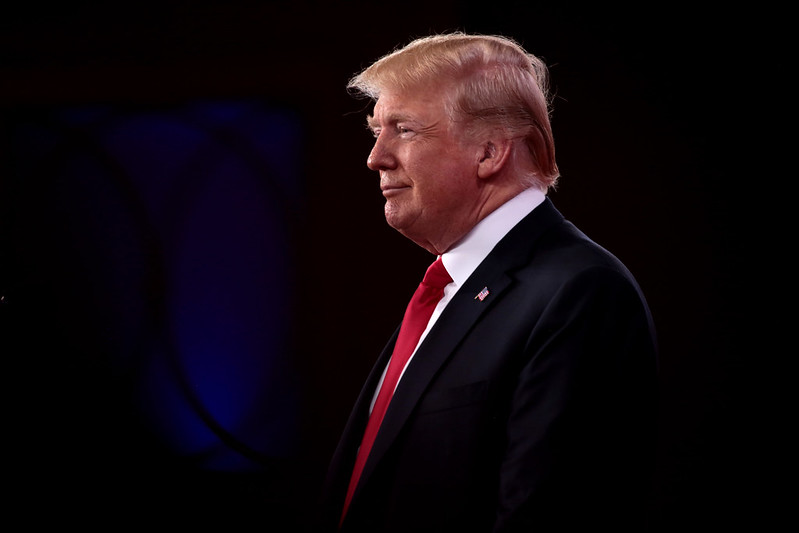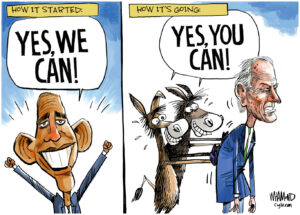A Staggering Number of Lobbyists Have Worked in the Trump Administration
According to a ProPublica investigation, 281 have held government positions—4 times as many as Barack Obama appointed six years into office. Gage Skidmore / Flickr
Gage Skidmore / Flickr
ProPublica is a nonprofit newsroom that investigates abuses of power. Sign up for ProPublica’s Big Story newsletter to receive stories like this one in your inbox as soon as they are published.
At the halfway mark of President Donald Trump’s first term, his administration has hired a lobbyist for every 14 political appointments made, welcoming a total of 281 lobbyists on board, a ProPublica and Columbia Journalism Investigations analysis shows.
With a combination of weakened rules and loose enforcement easing the transition to government and back to K Street, Trump’s swamp is anything but drained. The number of lobbyists who have served in government jobs is four times more than the Obama administration had six years into office. And former lobbyists serving Trump are often involved in regulating the industries they worked for.
Even government watchdogs who’ve long monitored the revolving door say that its current scale is a major shift from previous administrations. It’s a “staggering figure,” according to Virginia Canter, ethics chief counsel for the D.C.-based legal nonprofit Citizens for Responsibility and Ethics in Washington. “It suggests that lobbyists see themselves as more effective in furthering their clients’ special interests from inside the government rather than from outside.”
We tracked the lobbyists as part of an update to Trump Town, our database of political appointees. We’ve added the names of 639 new staffers with the administration and the financial disclosures of 351 political appointees who have filled different positions over the past year, and we tracked the careers of 338 who departed government during the same period.
The full extent of the lobbying industry’s influence is hard to measure because federal agencies decline to share details of recusals granted to officials who disclose potential conflicts with their new government roles.
Consider Colin Roskey. Days after leaving a two-decade career as what one former employer called the “smartest” health care lobbyist, he joined the Department of Health and Human Services in January. As deputy secretary for legislation for mandatory health, he headed the portfolio that he tried to influence for most of his career.
HHS declined to reveal any recusals he signed while appointed. A spokesman said that “all employees are expected to abide by the ethics rules.”
Just days before joining HHS, Roskey listed among his clients major dialysis providers that receive federal payments through Medicare, including Fresenius Medical Care — an industry juggernaut, with more than 330,000 patients in thousands of dialysis clinics in the U.S. A third of the company’s billion-dollar revenue comes from Medicare. A recent revamp in the dialysis industry ordered by Trump, expected to shift millions of dollars from dialysis centers to cheaper home-based options, put Roskey’s office at the heart of regulating how much profit or loss some of his former clients will see in coming years. Roskey said in an interview that he recused himself from this matter.
Public records show that Roskey lobbied for at least 27 clients between January 2017 and December 2018 on an array of issues other than dialysis involving public health care programs, from prescription drugs to palliative care.
In early October, Roskey stepped out of government and went straight back to work for his old lobbying firm, Lincoln Policy Group, which specializes in health care policy. “Spending time at HHS will make [Roskey] even more valuable to our team — and we are so excited to have him back,” the lobbying firm announced in a statement.
Roskey said he had no knowledge of how the new kidney care regulations will be implemented.
After his monthslong stint with the Health Department, Roskey said he plans to lobby the legislative branch, which is not prohibited by the current ethics rules. “While working with the government I gained knowledge and background, intellectually and professionally, and I intend to unapologetically utilize those skills for my employer and clients,” he said.
The senior-level appointment of a key lobbyist raises concerns for ethics experts like Canter. “There’s no way [he would’ve been hired under Obama] because Trump dropped a key provision of the Obama ethics pledge,” she said.
Indeed, an Obama-era ethics pledge clause absent in Trump’s prevented registered lobbyists from seeking or accepting employment with any executive agency that they lobbied the two years prior.
Federal laws forbid government employees who have served as registered lobbyists in the two years prior to their appointment from handling the particular matters or the specific issue areas that they used to lobby. Similarly, after leaving the government, all appointees-turned-lobbyists are barred from seeking to influence their former agencies and engaging in behind-the-scenes work with other senior officials across the administration.
The revolving door, of course, has been spinning since well before the Trump administration. In 2009, after President Barack Obama took office, ProPublica built a smaller version of Trump Town. During his administration, government watchdog groups also decried the conflicts of interest brought by some political appointees, and The Washington Post tallied 65 lobbyists among Obama’s ranks in five years.
One Obama-era alum, for instance, has gone on to lobby for the nation’s largest pharmaceutical industry trade group, according to public records. Bridgett Taylor, who occupied Roskey’s position until Trump took office, left the government to lobby Congress and federal agencies on matters related to those she oversaw at HHS. Taylor declined to comment. A spokesperson for the Pharmaceutical Research and Manufacturers of America, Taylor’s employer, said that although Taylor was listed as a lobbyist and HHS as a contacted agency, “that does not mean that she lobbied them,” but that her colleagues did.
If it’s certainly not new, the enforcement of ethics provisions has lagged under Trump. In governmentwide surveys conducted by the Office of Government Ethics, federal agencies reported only 106 registered lobbyists who joined the administration. In their answers, ethics officers argued that they “don’t know” how many registered lobbyists had been hired or that they didn’t “track the number of individuals who fell into this category.” When asked about referrals for further enforcement of ethics violations, an officer admitted that they “don’t maintain a centralized database of the bases of proposed disciplinary actions.”
Jeff Hauser, who heads the Revolving Door Project at the nonpartisan Center for Economic and Policy Research, contends that “Trump has organized the executive branch as a mechanism to reward allies and their political power. Lobbyists are hired not because they’re great at the specific matter that they lobby for but because their specialty is delivering political results.”
Corporations also see value in hiring former government staffers, as they bring connections within the agencies and exceptional knowledge about regulation. Among the staffers who recently left their administration positions, 29 went to work for K Street firms — as registered lobbyist or not. At least 59 former employees have done so over the past three years.
One is Laura Kemper, a former HHS senior official who, within days of leaving her post in March, was hired by Fresenius. Now vice president for government affairs, Kemper heads the company’s policy group.
According to lobbying records, she is listed among the in-house lobbyists who have visited Congress, the White House and HHS since March, pushing everything from reimbursement for dialysis services to home dialysis. The records show Fresenius shelled out more than $2.2 million for lobbying activities during the first half of the year.
Kemper had also spent years lobbying Congress and federal agencies on behalf of health care companies before joining HHS in March 2017.
Her pass through the revolving door tests the boundaries of ethics rules. Indeed, Trump’s pledge prohibits staffers-turned-registered lobbyists from advocating for the special interests of their corporate bosses before the agencies where they used to work for at least five years. It also restricts former employees from behind-the-scenes lobbying with any senior federal official for the remainder of Trump’s presidency. Kemper signed that pledge.
Kemper declined to comment. In a statement, Fresenius said Kemper “has strictly followed her legal and ethical obligations and has not been involved in lobbying the administration or anything related to the Executive Order.” Disclosure forms filed by Fresenius “cite the general activity of a team and do not ascribe any particular lobbying activity,” according to its statement.
Recently, during an earnings call to investors, Fresenius CEO Rice Powell said that the company has talked to the “appropriate people in Washington,” without naming any particular Fresenius or government staffer. “We are in the midst of commenting and asking questions” with HHS officials, he added.
As ProPublica has reported, political appointees who return to lobbying have found ways to tiptoe around ethics rules. Some register as lobbyists but limit their interactions to Congress, leaving colleagues to lobby the executive branch. Ethics restrictions don’t apply to congressional lobbying.
One such case is Geoffrey Burr, a lobbyist who joined the Labor Department early in the Trump administration. More recently, he was chief of staff to Transportation Secretary Elaine Chao. He left the Transportation Department in January and soon became policy director at one of the nation’s largest lobbying firms.
According to records, Burr now lobbies for clients with a stake in transportation issues, including The Northeast MAGLEV, the company behind what would be the first high-speed train in the U.S. A January press release announcing his hiring praised Burr’s “high-level involvement with Transportation and Labor [that will] provide clients with the strategic guidance they need to navigate business issues with the administration.”
Burr signed the ethics pledge and, according to records, lobbies only Congress, abiding by the rule of not contacting the executive branch. Other partners at his firm lobby the Transportation Department and the White House’s Office of Management and Budget.
The Transportation Department didn’t respond to requests for comment, and Burr declined to talk.
There are also former Trump administration staffers who go back to K Street but don’t register as lobbyists — the Lobbying Disclosure Act only requires those who spend 20% or more of their time lobbying to register.
Rebecca Wood and Brooke Appleton held senior Trump administration positions for more than a year at the Food and Drug Administration and the Agriculture Department, respectively. Both left the administration and returned to their former employers — this time, in more senior positions.
Wood now leads the food and drug practice at Sidley Austin, a powerful law and lobbying firm in Washington, where her colleagues lobby the FDA for various clients. Appleton went from being director to vice president for public policy for the National Corn Growers Association; she leads at least six people lobbying the Agriculture Department and other federal agencies.
Appleton declined to comment. Wood said she “advises clients on FDA-related issues and, in doing so, complies with all applicable ethics requirements.”
There is nothing illegal about returning to an old employer or being hired by a new one. Nor is there anything wrong with having colleagues who lobby the federal government. But the revolving door does present the possibility of conflicts of interests.
“The most important commodity in D.C. is information,” Hauser said. “Former insiders have rare access to strategic intelligence, which is of significant value to corporate entities, and they can do so without registering as a lobbyist.”
With the new data just released, Trump Town grew to include 3,859 names, 2,319 financial disclosures and hundreds of other records for Trump’s staffers. Our original goal remains intact: shining a light on the people in charge of running the government and how their career histories might influence their decisions.
David Mora is a reporting fellow for Columbia Journalism Investigations, a team of reporters, faculty and postgraduate fellows who examine issues of public interest. Funding for CJI’s work on this project is provided by the Investigative Reporting Resource, the Stabile Center for Investigative Journalism and the David and Helen Gurley Brown Institute for Media Innovation at the Columbia Journalism School.
As we navigate an uncertain 2025, with a new administration questioning press freedoms, the risks are clear: our ability to report freely is under threat.
Your tax-deductible donation enables us to dig deeper, delivering fearless investigative reporting and analysis that exposes the reality beneath the headlines — without compromise.
Now is the time to take action. Stand with our courageous journalists. Donate today to protect a free press, uphold democracy and uncover the stories that need to be told.






You need to be a supporter to comment.
There are currently no responses to this article.
Be the first to respond.